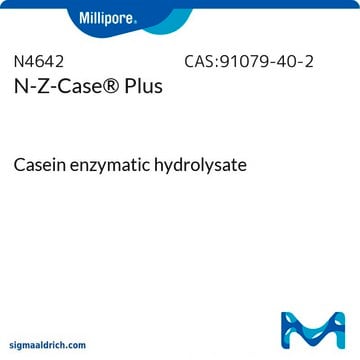Recommended Products
biological source
Porcine
bovine
Quality Level
description
Amino nitrogen ≥ 8%
Total nigrogen ≥11%
form
powder
technique(s)
microbiological culture: suitable
Looking for similar products? Visit Product Comparison Guide
Application
N-Z-Amine® has been used in culture mediums to grow and produce enterotoxins by Staphylococcus.
Quality
Preparation has a high level of free amino acids.
Legal Information
N-Z-Amine is a registered trademark of Kerry Group
Storage Class Code
11 - Combustible Solids
WGK
WGK 1
Flash Point(F)
Not applicable
Flash Point(C)
Not applicable
Personal Protective Equipment
dust mask type N95 (US), Eyeshields, Gloves
Choose from one of the most recent versions:
Certificates of Analysis (COA)
Lot/Batch Number
Don't see the Right Version?
If you require a particular version, you can look up a specific certificate by the Lot or Batch number.
Already Own This Product?
Find documentation for the products that you have recently purchased in the Document Library.
C Genigeorgis et al.
Applied microbiology, 21(5), 862-866 (1971-05-01)
Growth and production of enterotoxin C by Staphylococcus aureus strain 137 in 3% + 3% protein hydrolysate powder N-Z Amine NAK broths with 0 to 12% NaCl and an initial pH of 4.00 to 9.83 were studied during an 8-day
Staphylococcus aureus enterotoxin B release (excretion) under controlled conditions of fermentation.
J F Metzger et al.
Applied microbiology, 25(5), 770-773 (1973-05-01)
Release of Staphylococcus aureus enterotoxin B (SEB) into the culture medium was initiated during the mid-log phase of growth. A medium consisting of 4% N-Z Amine A (Sheffield), 0.2% dextrose, and 1% yeast extract supported maximum production of SEB. Although
T N Morita et al.
Applied and environmental microbiology, 38(1), 39-42 (1979-07-01)
From comparisons of 4% N-Z Amine NAK made with distilled water, naturally hard water, and synthetic salt solutions, it appeared that magnesium and, to a lesser extent, iron were limiting factors in the production of staphylococcal enterotoxins B and C
Our team of scientists has experience in all areas of research including Life Science, Material Science, Chemical Synthesis, Chromatography, Analytical and many others.
Contact Technical Service








